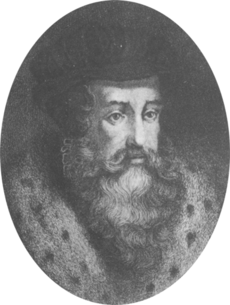Luigi Alamanni facts for kids
Luigi Alamanni (born March 6, 1495, died April 18, 1556) was an Italian poet and a leader in government. He wrote many different kinds of poems. People remember him for bringing the epigram (a short, witty poem) into Italian poetry.
Luigi Alamanni's Life Story
Luigi Alamanni was born in Florence, Italy. His family supported the powerful Medici family. However, Luigi felt unfairly treated by Giulio de' Medici. Because of this, Luigi joined a secret plan against Giulio. This plan failed.
Giulio de' Medici soon became Pope Clement VII. Luigi had to escape to Venice to be safe. When Giulio became pope, Luigi had to flee even further, all the way to France.
In 1527, the people of Florence removed the Medici family from power. They set up their own government, called a republic. Alamanni returned to Florence and played an important role in this new government.
Florence was fighting against the Holy Roman Emperor Charles V. But France, Venice, and the Pope made peace with the Emperor. This left Florence to fight alone. Charles V then ordered his armies to attack Florence. His goal was to bring the Medici family back to power.
After a long siege in 1530, the Emperor's forces won. The Medici family returned to rule Florence. Alamanni had to escape again, this time back to France. He wrote most of his poems while living there.
The French King Francis I liked Alamanni very much. After a peace treaty in 1544, King Francis sent Alamanni to meet with the Holy Roman Emperor Charles V. This was a very important job.
Once, while Alamanni was speaking to Emperor Charles, the Emperor stopped him. Charles quoted a line from one of Alamanni's old poems. The line was about a "ravenous eagle" with "two crooked bills." This was a hidden jab at the Emperor's symbol, the double-headed eagle. Alamanni quickly replied that he wrote that line as a poet, using made-up stories. But now, as an ambassador, he could only speak the truth. Emperor Charles was pleased with this clever answer and even praised Alamanni.
After King Francis died, his son Henry II also trusted Alamanni. In 1551, Henry sent Alamanni as an ambassador to Genoa. Alamanni died in Amboise, France, on April 18, 1556.
Alamanni's Writings
Luigi Alamanni wrote many poems. They were known for their clear and excellent style. One of his best works is a teaching poem called La Coltivazione. It was written in 1546 and was inspired by an ancient Roman poem about farming.
His book Opere Toscane (published in 1532) contains funny and critical poems. These poems were written in blank verse, which means they don't rhyme. Alamanni's use of this style was important. Another poet, Sir Thomas Wyatt, even used Alamanni's work as a model for his own English poems.
Alamanni also started an unfinished poem called Avarchide. It was meant to be like the ancient Greek epic Iliad. He wrote this poem when he was older, but it is not considered his best work.
Some people thought Alamanni was the first to use blank verse in Italian poetry. However, another poet named Giangiorgio Trissino actually used it before him.
Another poet, Isabella di Morra, wrote a sonnet (a type of poem) dedicated to Alamanni. Its title means "Not only was heaven generous and courteous to you."
Alamanni also appears as a character in a famous book called The Art of War. This book was written by Machiavelli. It is set up as a conversation between real people, including Alamanni. In the book, Alamanni is shown as a loyal friend and the youngest person in the group.
See also
 In Spanish: Luigi Alamanni para niños
In Spanish: Luigi Alamanni para niños
 | Tommie Smith |
 | Simone Manuel |
 | Shani Davis |
 | Simone Biles |
 | Alice Coachman |


